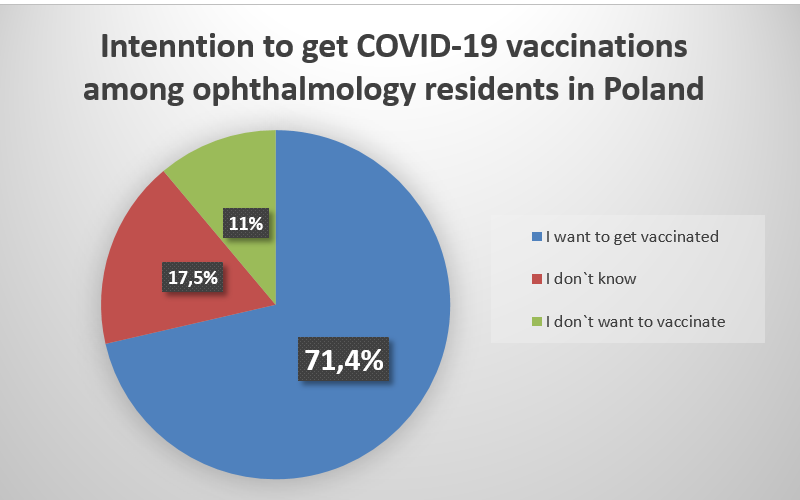In April 2021, the journal Vaccines (IF = 4.086) published an article on the attitude towards vaccination against COVID-19 by ophthalmology residents in Poland. The idea for such article appeared at the time of the second wave of the SARS-CoV-2 pandemic was developing in Poland and around the world, and work on the approval of the COVID-19 vaccine for general use was still ongoing.
Due to decreased scheduled work of ophthalmology departments, teaching program of residents was significantly limited, and their daily work with urgent ophthalmic cases was associated with an increased risk of SARS-CoV-2 infection. Seeing the impact of the pandemic we decided to assess the perception and attitude of resident ophthalmology doctors towards the pandemic and possible future vaccinations against COVID-19.
We created a proprietary questionnaire, the purpose of which was to gather information about the impact of the pandemic on a number of aspects of their professional and personal life, including: 1) implementation of specialization program, 2) new virtual methods of teaching ophthalmology, 3) mental health, or 4) reasons for taking or not taking the COVID-19 vaccine which was the main focus of our article that eventually appeared in Vaccines.
The survey was disseminated among ophthalmology residents in Poland via social media as well as with the active help of Professor Marek Rękas who works as National Ophthalmology Consultant. Answers were collected in the first week of January and almost coincided with the first COVID-19 vaccinations. The response to the survey was huge.
71.4% of the respondents declared their will to vaccinate against COVID-19, 17.5% were undecided, and 11.1% did not plan to take the vaccine (see diagram below). Significantly more often the will to vaccinate against COVID-19 was reported by people who were married or in partnership with children compared to those without children (82.6% vs. 55.6%) and people living with a family/partner compared to people living alone (78/72% vs. 57%).

The motivations for accepting or not taking the vaccine were interesting. They are presented in Tables 1 and 2. They differed depending on marital status, residence status and COVID 19 incidence. The respondents could choose several answers.
Table 1. Main reasons behind vaccination against COVID-19
Reason | % | |
1. | Fear of infecting family and relatives | 92,2 |
2. | Belief in the effectiveness of the vaccine in controlling the pandemic | 77,8 |
3. | Fear of getting infected | 70,0 |
4. | To set a good example | 68,9 |
5. | Taking advantage of the sanitary regime concessions for the vaccinated | 43,3 |
6. | Belief in vaccine safety | 25,5 |
Those who contracted COVID-19 and those intending to vaccinate were mostly driven by the expected relief in sanitary restrictions for the vaccinated. Married or unmarried people with children believed that the vaccine would be effective in managing the pandemic more than those without children or singles and those fearing contamination. Residents living with their family or partners more often than those living alone believed in the effectiveness of the vaccine. Also the fear of infection with COVID-19 for themselves and their family was an argument in favour of vaccination.
Table 2. Main reasons for refusing to vaccinate against COVID-19
Reason | % | |
1. | Vaccine is not efective | 72,2 |
2. | Vaccine is not safe | 58,3 |
3. | Risk of side effects | 41,7 |
4. | As a person who has contracted COVID-19, I do not need to get vaccinated | 41,7 |
5. | I do not believe in pandemic | 2,8 |
Those who contracted COVID-19 significantly more often refused to take a vaccine providing expected immunity as the reason. Single people, people living alone, and married / unmarried couples without children were more likely to indicate the willingness to wait for the effectiveness and long-term side effects of the vaccine to be assessed.
The results obtained by us seem particularly interesting. Especially when taking into account that many countries including Poland are facing difficulties with vaccinating a sufficiently large group of society in order to obtain the so-called “herd immunity”. But still vaccine scepticism remains high. Knowing the arguments for and against vaccination of various social groups, we can look for ways to encourage vaccination in a more effective way such as introduction of specific benefits for vaccinated people and sanitary relief. Also in our case we are talking about young people who relatively mildly experience the infection if it occurs, and at the same time having the appropriate medical knowledge to assess the need for extensive vaccination,
Our article is the first published article in the world where we present assessment of the motivations of ophthalmology residents to take or not take the COVID-19 vaccine and one of the few on healthcare workers' vaccination attitudes. We want to conduct further studies on this matter and we find it particularly interesting to compare the first opinions of vaccinated and unvaccinated young ophthalmologists, from the time before mass vaccination (which is what our survey is about) with the current ones, when the idea of mass vaccination against COVID-19 became a reality.
Iwona Obuchowska, MD, Ph.D.
Intention to Get COVID-19 Vaccinations among Ophthalmology Residents in Poland: A Cross-Sectional Survey.
J. Konopińska1, I. Obuchowska1, Ł. Lisowski1, N. Dub1, M. Kozera2, M. Rękas2
1Department of Ophthalmology, Medical University of Bialystok, 15-276 Bialystok, Poland
2Department of Ophthalmology, Military Institute of Medicine, 04-141 Warsaw, Poland
These authors contributed equally to this study and should be considered as co-first authors.
Vaccines 2021, 9(4), 371; https://doi.org/10.3390/vaccines9040371
Received: 3 March 2021 / Revised: 3 April 2021 / Accepted: 6 April 2021 / Published: 11 April 2021



